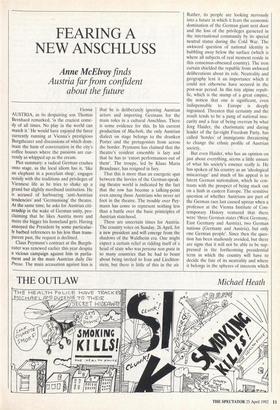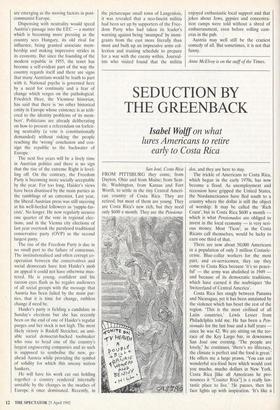FEARING A NEW ANSCHLUSS
Anne McElvoy finds
Austria far from confident about the future
Vienna AUSTRIA, as its despairing son Thomas Bernhard remarked, 'is the craziest come- dy of all times. No play in the world can match it.' He would have enjoyed the farce currently running at Vienna's prestigious Burgtheater and discussions of which dom- inate the hum of conversation in the city's coffee houses where the passions are cur- rently as whipped up as the cream.
Plot summary: a radical German crashes onto stage, as the local idiom has it, 'like an elephant in a porcelain shop', engages noisily with the traditions and privileges of Viennese life as he tries to shake up a grand but slightly moribund institution. He is accused of harbouring 'anti-Austrian tendencies' and 'Germanising' the theatre. At the same time, he asks for Austrian citi- zenship in the wake of German unity, pro- claiming that he likes Austria more and more the bigger his homeland gets. Having annoyed the President by some particular- ly barbed references to his less than trans- parent past, the request is declined.
Claus Peymann's contract at the Burgth- eater was renewed earlier this year despite a vicious campaign against him in parlia- ment and in the main Austrian daily Die Presse. The main accusation against him is that he is deliberately ignoring Austrian actors and importing Germans for the main roles in a cultural Anschluss. There is some evidence for this. In his current production of Macbeth, the only Austrian dialed on stage belongs to the drunken Porter and the protagonists from across the border. Peymann has claimed that the theatre's resident ensemble is lazy and that he has to 'extort performances out of them'. The troupe, led by Klaus Maria Brandauer, has resigned in fury.
That this is more than an energetic spat between the luwies of the German-speak- ing theatre world is indicated by the fact that the row has become a talking-point even among those Austrians who never set foot in the theatre. The trouble over Pey- mann has come to represent nothing less than a battle over the basic priniciples of Austrian statehood.
These are uncertain times for Austria. The country votes on Sunday, 26 April, for a new president and will emerge from the shadows of the Waldheim era. One might expect a certain relief at ridding itself of a head of state who was persona non grata in so many countries that he had to boast about being invited to Iran and Liechten- stein, but there is little of this in the air.
Rather, its people are looking nervously into a future in which it fears the economic domination of the German giant next door and the loss of the privileges garnered in the international community by its special neutral status during the Cold War. The awkward question of national identity is bubbling away below the surface (which is where all subjects of real moment reside in this consensus-obsessed country). The iron curtain shielded the republic from awkward deliberations about its role. Neutrality and geography lent it an importance which it could not otherwise have secured in the post-war period. In this tiny alpine repub- lic, which is the stump of a great empire, the notion that one is significant, even indispensable to Europe is deeply ingrained. Threaten that certainty and the result tends to be a pang of national inse- curity and a fear of being overrun by what Jorg Haider, the charismatic and daring leader of the far-right Freedom Party, has called 'hordes' of immigrants threatening to change the ethnic profile of Austrian society.
But even Haider, who has an opinion on just about everything, seems a little unsure of what his society's essence really is. He has spoken of his country as an 'ideological miscarriage' and much of his appeal is to latent German nationalism, which he con- trasts with the prospect of being stuck out on a limb in eastern Europe. The sensitive question of whether Austrians are part of the German race last caused uproar when a professor at the Vienna Institute of Con- temporary History ventured that there were 'three German states (West Germany, East Germany and Austria), two German nations (Germany and Austria), but only one German people'. Since then the ques- tion has been studiously avoided, but there are signs that it will not be able to be sup- pressed in the forthcoming presidential term in which the country will have to decide the fate of its neutrality and where it belongs in the spheres of interests which are emerging as the moving factors in post- communist Europe.
Dispensing with neutrality would speed Austria's passage into the EEC — a matter which is becoming more pressing as the country sees Hungary, its old rival for influence, being granted associate mem- bership and making impressive strides in its economy. But since the founding of the modern republic in 1955, the tenet has become a self-evident part of the way the country regards itself and there are signs that many Austrians would be loath to part with it. National psyche is governed here by a need for continuity and a fear of change which verges on the pathological. Friedrich Heer, the Viennese historian, has said that there is 'no other historical entity in Europe whose existence is as teth- ered to the identity problems of its mem- bers'. Politicians are already deliberating on how to present a referendum on forfeit- ing neutrality (a vote is constitutionally demanded) without risking the people reaching the 'wrong' conclusion and con- sign the republic to the backwater of Europe.
The next five years will be a lively time in Austrian politics and there is no sign that the rise of the extreme Right is level- ling off. On the contrary, the Freedom Party is becoming more socially acceptable by the year. For too long, Haider's views have been dismissed by the main parties as the ramblings of an extremist. Last year, the liberal Austrian press was still sneering at his well-heeled followers as 'yuppie-fas- cists'. No longer. He now regularly secures one quarter of the vote in regional elec- tions, and in the Vienna city elections of last year overtook the paralysed traditional conservative party (OVP) as the second largest party.
The rise of the Freedom Party is due in no small part to the failure of consensus. The institutionalised and often corrupt co- operation between the conservatives and social democrats have lent Haider's mob an appeal it could not have otherwise mus- tered. He is young, confident and his racoon eyes flash as he regales audiences of all social groups with the message that Austria has been failed by the main par- ties, that it is time for change, ruthless change if need he.
Haider's party is fielding a candidate in Sunday's elections but she has recently been on the end of one of Haider's regular purges and her stock is not high. The most likely victory is Rudolf Streicher, an ami- able social democrat-backed toolmaker who rose to head one of the country's largest engineering companies and as such is supposed to symbolise the new, go- ahead Austria while providing the symbol of solidity for which this uneasy nation hankers.
He will have his work cut out holding together a country rendered internally unstable by the changes in the swathes of Europe it once dominated. Recently, in the picturesque small town of Langenlois, it was revealed that a neo-fascist militia had been set up by supporters of the Free- dom Party who had taken its leader's warning against being 'swamped' by immi- grants from the east more literally than most and built up an impressive arms col- lection and training schedule to prepare for a war with the enemy within. Journal- ists who visited found that the militia enjoyed enthusiastic local support and that jokes about Jews, gypsies and concentra- tion camps were told without a shred of embarrassment, even before rolling cam- eras in the pub.
Austria may well still be the craziest comedy of all. But sometimes, it is not that funny.
Anne McElvoy is on the staff of the Times.



























































 Previous page
Previous page